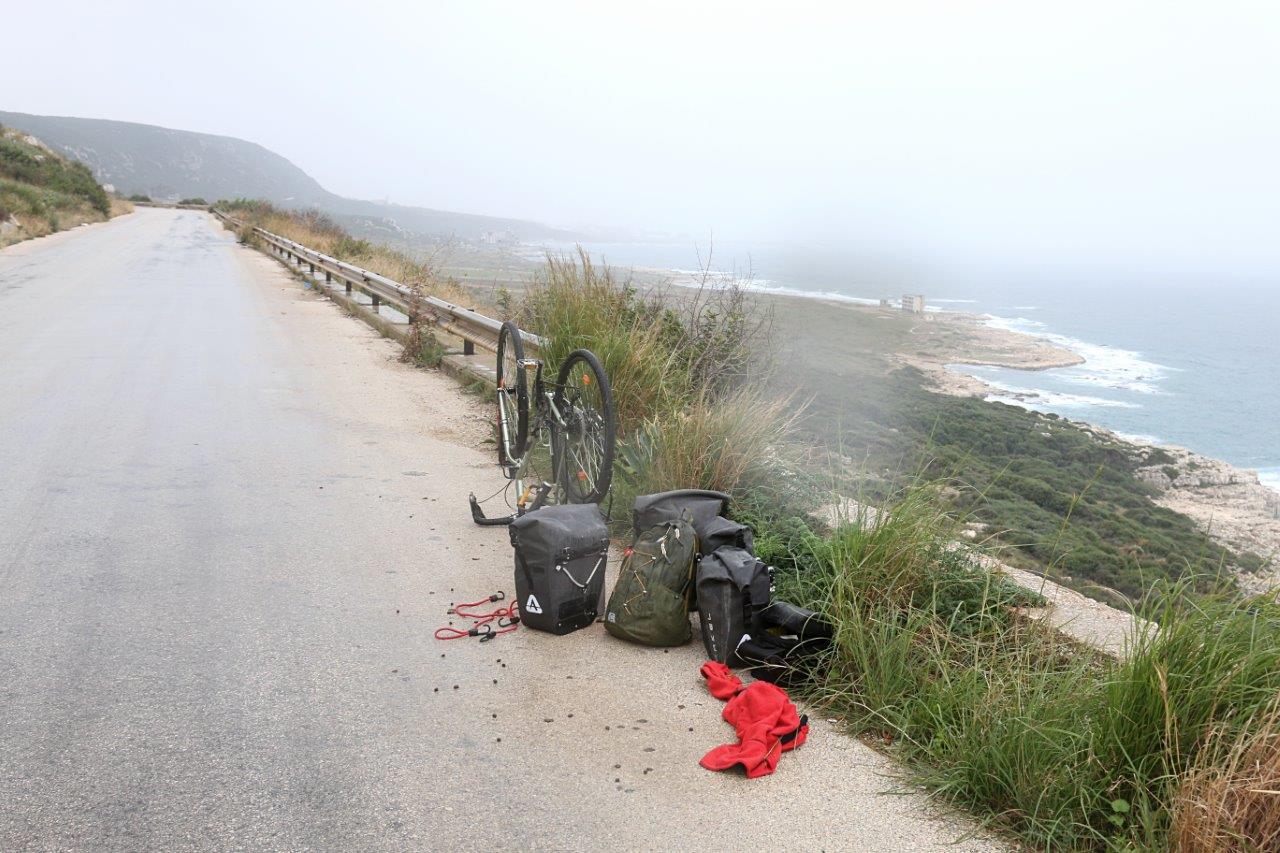
01 Feb 18: The beautiful & the damned (Lebanon)
Tripoli to Tyre, Lebanon (30 Dec – 8 Jan)
Total miles cycled: 3,646 (5,868km)
Thigh status: Obese Witchetty grub
Tripoli at dusk is a dispiriting place. As I cycle from the boat into the city centre, around me loom a series of sombre, grey tower blocks, rising like skeletal sentinels among a wasteland of debris. Several are sprinkled with bullet holes, I note with mild alarm, and I nudge Maud along a little faster. I’m fairly sure the local mercenaries have downed tools for the time being, but I’m already far too far behind schedule to risk being shot on my first day (though it would admittedly do wonders for my social media profile).
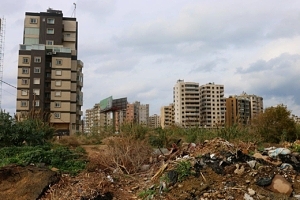
The beautiful, shining metropolis of Tripoli.
I’m hoping to stay with the friend of a friend of a friend, but am yet to hear back from him. It’s worrying, as the motels look poky and miserable, oozing an aura of indecency and regret. I distract myself from my plight by buying a tea in a grimy café and counting the perplexing number of passing Mercedes and BMWs, which seem by far the most popular car in this far-from-affluent city.
Two hours later, I finally hear from my contact, B. I am hugely relieved, and almost immediately the city’s shadowy nooks seem sunnier, its sharp edges softer. Within ten minutes, I’m being warmly welcomed by B and his Filipino housekeeper (apparently all houses have one) in his carpet shop just half a mile away. The sectarian conflict in the city is under control now, I’m told, and I feel a little foolish for conjuring spectres out of the undergrowth. How different everything seems when you’re no longer alone and abandoned in the dark!
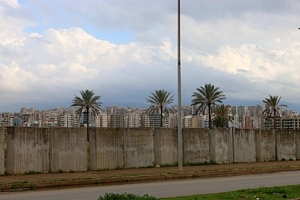
Moody skies, stained concrete & glimmers of greenery: my impression of Tripoli in a nutshell.
B is a 27-year-old Australian who moved to Lebanon seven years ago. He enjoys the ‘freedom’ here, he says, which seems to boil down to driving without a licence and not paying his taxes. I ask him about the cars and he tells me it’s due to people’s idolisation of Germany and their superficiality. Plastic surgery is reportedly huge, and often deliberately conspicuous. Everyone wants to flash their cash and status.
‘It makes my job easy,’ B says. ‘When I sell a carpet, I say, “You don’t want that one, they’re for ambassadors’ wives,” and hey presto, it’s sold!’
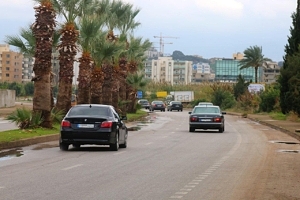
Every other car is a Mercedes of BMW. Almost literally.
In Tripoli, curiously, this showiness goes hand in hand with a strong social conservatism. Most women wear hijabs, and B tells me he wouldn’t want to be seen drinking in public. Here, the vast majority of people are Sunni Muslims (80%), with the rest divided evenly between Alawite (similar to Shia) Muslims and Maronite Christians.
Another friend later tells me that the city is surprisingly tolerant, despite its image. ‘You sometimes get burkinis and bikinis on the same beach, and nobody minds,’ she says. ‘But all people remember are the bloody jihadists splashed across the papers.’
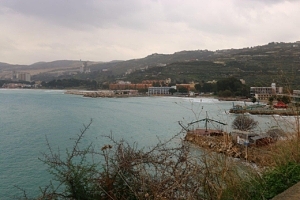
That is definitely not a storm on the horizon.
We meet a Christian friend of B’s at dinner, who grew up in a remote mountain village called Bikaakafra. There, people marry young, he says; his cousin was just 13. Yet their conservative values clearly have limits. He recently found a stash of porn mags under his Dad’s bed involving women, horses and dwarves, he recounts, and brought it up over the family Sunday lunch. ‘Nobody was bothered,’ he says cheerily. ‘We talk about everything.’
The next morning, as I prepare for my cycle to Beirut, B warns me that ‘the biggest storm of the year’ is due to hit today. But it’s sunny in the morning, and therefore – with the logic of someone who’s never lived in Britain, or indeed anywhere – I reason it will most likely stay that way forever. Plus, I’ve been looking forward to this for a while: the retracing of a cycle I did in 2013 that planted the seed of this trip in my mind. So I vow to try my luck nonetheless.
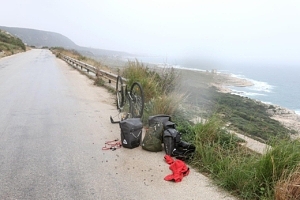
Damn it, actually it is.
As I stand drowning under a lashing sheet of rain that soaks me instantly to the core, following yet another puncture 30km down the road, I can’t help feeling that it may have been the wrong decision. For half an hour I wait, helpless and sodden, as the sky turns leaden and swampy and slowly engulfs the entire Mediterranean sea. Then, just as I’m losing hope of rescue, a car finally stops beside me and two textbook murderers (dirty trousers, rakish facial hair) get out and offer me a ride – an offer I know I should on no account accept.
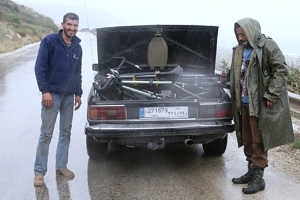
My saviours! Not murderers, despite all evidence to the contrary, but actually lovely guys.
Minutes later, we’re zooming down the road to Byblos. The men give me a satsuma, which I devour like somebody who hasn’t eaten for ten years (it’s been about ten minutes), and stop every mile or so to check Maud hasn’t fallen out the back (she hasn’t). They then drop me directly outside the restaurant where I’ve arranged to meet a friend; and, with a wave, they’re gone. Once again, human kindness trumps doom-laden distrust, I think relievedly. Is the world really crawling with as many psychopaths as the media would have us believe?
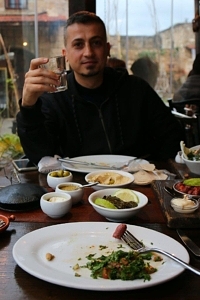
My friend, R, an atheist from a religious Maronite Christian family, and the first of many shamefully gluttonous feasts.
R, my friend, is a 34-year-old atheist from a deeply religious Maronite Christian family, who lives with his parents in Byblos. As we devour a feast of shawarma (kebab), makanek (sausages), tabouleh (parsley salad), mahshi warak enab (stuffed vine leaves) and baba ganoush (aubergine dip), he tells me about the disastrous state of Lebanese politics.
No president has been in office for 20 months and no effective government since 1975, he says. ‘There’s a semblance of democracy, but it’s actually a feudal system based on who you know. It’s corrupt to the core.’
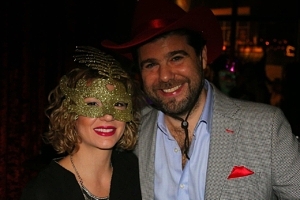
Paddy Cochrane & his fiance, who very kindly host me in Beirut – and show me how to party, Lebanese-style.
Politically, the balance of power in Lebanon is designed to reflect its tripartite demographic: a Christian Maronite president, Sunni prime minister and Shia parliamentary speaker. The country as a whole is reportedly 40% Christian, 27% Sunni and 27% Shia, though no formal census has been conducted since 1932 for fear of stoking sectarian tensions.
In truth, Lebanon’s socio-politics are unforgivably complicated for such a tiny sliver of a country. The Civil War alone illustrates its complexity. Here, you had Christian (Lebanese) vs Sunni (Palestinian); Shia (Syrian) vs Sunni (Palestinian); Jewish (Israeli) vs Sunni (Palestinian); Shia (Syrian) vs Christian (Syrian); Jewish (Israeli) vs Shia (Hezbollah); Christian (Lebanese) vs Sunni (Lebanese); Shia (Syrian) vs Christian (Lebanese) – in no particular order of significance.
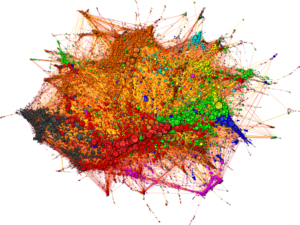
Lebanon’s socio-politics are tricky to explain, and are perhaps best illustrated by this simple four-dimensional line graph.
Throw in interference from the West (Christian/Jewish), Saudi Arabia (Sunni) and Iran (Shia), plus a devastating conflict on their eastern flank, and it seems less surprising the country is on the constant brink of collapse and more surprising that any of it remains intact at all.
For me, Lebanon barely exists as a political entity in its own right. It’s more a proxy for the region as a whole, reflecting the chaos and discord of its neighbours, with little substance of its own. Yet this is also perhaps also the country’s strength. Suffused in a state of permanent perplexity, the momentum and sheer uncontrollability of the forces whisking it into a frenzy seem to give it its unique character – like a vortex that must spin and spin to ensure survival.
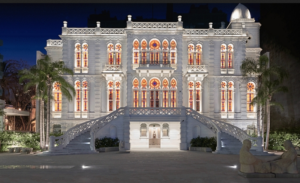
The stunning 19th century Sursock Palance, owned by Paddy’s mother, Lady Cochrane. This is not where I’m staying, sadly.
As the storm continues to swirl down around us, R drives me the final few miles to Beirut. I am spending the next few days at the flat of Paddy Cochrane, another friend-of-a-friend who owns several bars and (I later discover) is the son of renowned Lebanese aristocrat Lady Cochrane Sursock, owner of the stunning 19th century Sursock Palace. I suddenly feel like Eddie Murphy in Trading Places, and can’t help wondering who the poor lass is who’ll be assuming my role as a bummelling wino for the remaining 5,000km of the journey.
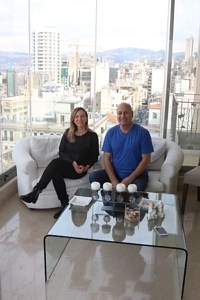
My other Lebanese property mogul friend, C, who lives in a penthouse suite on fashionable Gouraud St. Not the place for a grubby itinerant – though, if pushed, I reckon I could get used to it.
Worryingly, my first night in Beirut is New Year’s Eve. Event tickets can cost hundreds of dollars, but Paddy has kindly invited me to his party free of charge. He tells me to ‘dress us’ – and just as I’m wondering how to fashion a slinky gown out of some thermal leggings and a pair of padded underpants, I discover a scrunched up silk scarf from Turkey at the bottom of a pannier. I wrap and tie it around my torso, brush my hair and put on make-up for the first time in six months – and suddenly feel less like Eddie and more like Eliza Doolittle. Will they know I’m really just some vagrant imposter with a leathery arse, I wonder? I genuinely feel nervous.

Tramp disguised as lady for the Beirut ball. How long before someone finds me out?
The bash takes place at P’s bar on Beirut’s fashionable Gouraud St, frequented by expats and the Lebanese elite. For me, the night is fun but exhausting. It’s a long time since I quaffed endless spirits and bubbly with society’s haut monde, even in London. But Beirut is basically a city on a permanent bender, and nobody is exempt from its hedonistic clutches. Here, you party until you’re 60, and then you move seamlessly into your second childhood. Middle-age, like the middle-income, has been squeezed into submission.
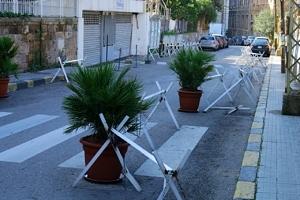
Spiky metal barriers found all over this highly militarised city.
Around 4am, at the after-party, the discussion turns serious. ‘It’s got to the point where people don’t mind the corruption,’ one man says, in reference to the mountains of garbage piling up in the streets, which the government has failed to clear for half a year. ‘They just want the government to do something. Anything.’
The rest of the night is a bit of a blur, and I spend the next day mainly lying in the foetal position in the dark. On January 2nd I go to visit the father of a friend, C, another property mogul with a Gouraud St penthouse. He tells me how lots of Christians prefer to speak French to avoid identifying as Arab, with merci frequently used instead of shukran for ‘hello’.
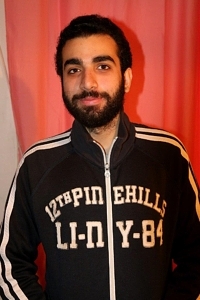
Migration Community Center co-ordinator Ramy Shukr. ‘No-one’s checking if workers are being overworked, locked in, beaten,’ he says. ‘Sometimes they don’t get paid for months.’
‘The Muslims need the Christians to have a foothold in the West,’ C (a Christian) says. ‘But they don’t want them gaining too much control. Hence the power struggles.’
We talk about women and C tells me that Lebanon is deeply patriarchal. Women are severely discriminated against, he says, and sexual violence is common. ‘Women won’t get promoted unless they’re sleeping with the boss,’ he says. ‘There’s a strong cultural impulse to see men as the providers.’
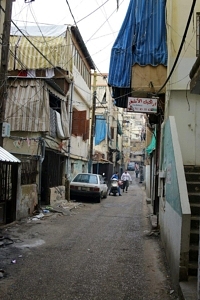
An uncharacteristically quiet street in the run-down Shia district of southern Beirut, where I inadvertently stumble on my way out of the city (I am too much of a chicken to take pics in the throng).
The next day, I brave the sprawling glut of Beirut traffic, which seems constantly paralysed yet somehow faintly functional – reflecting perfectly the general state of the country – to buy a pair of the city’s best tyres. They look distinctly flimsy to me, but I’m reassured that they’re ‘puncture proof’ – and it turns out they are, for a full six minutes. I do a swift calculation: if things continue at this rate, by the time I complete my trip I’ll have racked up an inconvenient-if-impressive 15,000 punctures. I decide to grab a few more patches.
My second host in Beirut is the sister of a friend, B, and her family. They are lovely and welcoming, and the flat is enormous. As she shows me around, she points out a small cubbyhole off the kitchen around six metres square. ‘That’s where migrant workers are meant to sleep,’ she tells me. ‘Most homes employ housekeepers, but they’re often treated terribly.’
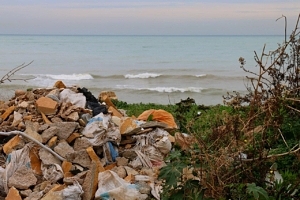
Essence of Lebanon: beautiful nature juxtaposed with crap.
I learn about this in more detail at a meeting with the Migration Community Center (MCC), which provides support for migrants and refugees. Their members come predominantly from Africa and Asia, and earn around $200 a month as domestic workers. All need Lebanese sponsors to work here, and most are forced to give up their passports. The majority suffer some form of abuse, I am told.
‘There are lots of problems,’ says MCC co-ordinator Ramy Shukr. ‘No-one’s checking if workers are being overworked, locked in, beaten. Sometimes they don’t get paid for months.’
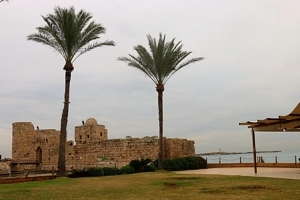
Sidon Sea Castle, built by the Crusaders in the 13th century, where I stop for a bite to eat on my way from Beirut to Tyre.
On January 7th, I take a trip down the coast to Tyre. My plan is to spend the night, before returning to Beirut to fly to Jordan: the only escape route that doesn’t involve illegally entering a war zone or plunging head-first into the Mediterranean. Escaping the city proves a challenge, however, as a fiendish gauntlet of gridlocked Mercedes conspires to cast me and Maud prematurely into the afterlife. We then lose our way – a particular skill of mine on straight roads with little scope for error – and find ourselves deep in Shia territory in the south of the city.
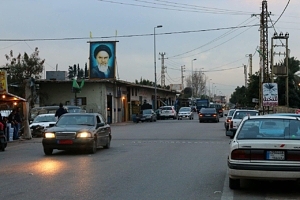
The outskirts of Tyre, governed by the Shia Islamist militant group Hezbollah. For some reason, I’d thought the hold Iran had over the group would be fairly subtle – but clearly not.
This area is clearly poor and neglected, comprising a labyrinth of winding alleys, maniacal children, errant mopeds and blackened shacks. Old tyres and husks of rusty cars line the streets, while mangy dogs snuffle in swampy puddles and furtively lick their balls.
However, after a brief and mildly traumatising stop in the public loo, I finally escape Beirut’s clutches and reach the ‘old coastal road’ to Tyre. This transpires to be neither old nor particularly coastal, and the next few hours are spent rolling through a series of shabby, nondescript towns, with occasional glimpses of the sea. After a series of army checkpoints, I stop for lunch in Sidon – one of the oldest Phoenician cities, dating from around 4,000BC – before resuming my journey south.
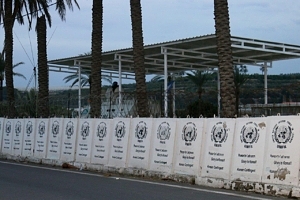
Since the end of the 2006 Lebanon War, the United Nations Interim Force in Lebanon (UNIFIL) has been responsible for maintaining peace and security in south Lebanon. The region has experienced several bloody clashes between Hezbollah and Israel (to the south) over recent decades.
The light starts to fade as I approach Tyre. Here, the Shia Islamist group Hezbollah, funded by Iran, rules the roost, and large portraits of Ayatollah Khomeini, the Supreme Leader of Iran, loom from the sidelines. Alongside hang dozens of photographs of young men, who I later discover are ‘martyrs’ killed by the Israelis.
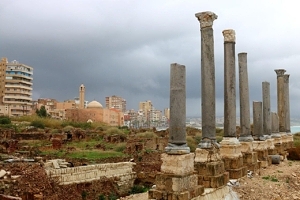
Roman ruins in Tyre, under an ominous sky.
Then, with unsettling swiftness, night falls and – having cleverly forgotten my lights – I struggle to orientate myself in the gloom. Tyre seems to comprise a series of interlocking construction sites, and I soon find myself lost in a maze of covered walkways filled with garbage and shisha smokers. Just as I’m about to give up hope of finding my friend’s flat, a hand extends from a darkened doorway with a cup of tea.
‘Everything ok?’ the man asks – and suddenly, with that simple gesture, everything absolutely is.
To be continued…
Follow my journey on Twitter at reo_lowe, Instagram at bexio8 or Facebook at facebook.com/bexbicyclediaries.


Katalin Lowe
Posted at 14:04h, 01 FebruaryWonderfully entertaining bit of writing, most enjoyable. You gave a very good and realistic account of the multi-layered Lebanon society and its pretensions. Political life is so complicated there I am not surprise they care mainly about superficial enjoyments and the flaunting of wealth. I would have loved to see you in your improvised evening gown competing with haute couture.
Is it possible you are only about halfway through your journey here? Keep the blogs coming, they are always a special treat!
reol8
Posted at 10:29h, 02 FebruaryI’ve updated the piece with a pic of me in my Cinderella glad rags, so you can compare & contrast. Sadly no fairy godmother to stop me descending back into my default bag lady state, though… xx
Wendy Feltham
Posted at 06:49h, 02 FebruaryI always enjoy reading your adventures, and appreciate your honest insights and observations along the way. You and Maud are quite courageous. Thank you for sharing your amazing commentary and photos across the world!
reol8
Posted at 10:31h, 02 FebruaryThanks Wendy, v kind of you! Maud is really the courageous (some say foolish) one – I just tag along for the ride. Thanks so much for reading, Bex x
Joan Fogel
Posted at 18:21h, 04 FebruaryDear Rebecca
Thank you! More vicarious traveling. Please take care. Very best, Joan
reol8
Posted at 09:42h, 06 FebruaryThanks so much for the support, Joan – all best, Rx
Kate Rawles
Posted at 20:52h, 04 FebruaryI love The Bicycle Diaries! Just reading this one in hostel in Santa Marta, Colombia having so far survived the wonders of Colombian trucks/buses/scooters. But Lebanese Mercedes, wow. even traffic is relative…… Your diaries are brilliant, insightful, succinct and very funny. Thanks! @carboncyclekate, en route to Patagonia on a bamboo bike, raising awareness of biodiversity loss…. more info at http://www.outdoorphilosophy.co.uk – The LIfe Cycle
reol8
Posted at 10:09h, 06 FebruaryHi Kate – thanks so much for the support! Just took a look at your blog. Your trip looks incredible – not to mention your extraordinary bamboo bike. What is that like to ride? Isn’t it in fear of being eaten by the local wildlife? Do stay in touch on your trip, and GOOD LUCK! x
Kate Rawles
Posted at 22:53h, 06 FebruaryThanks!! Bike is heavy but great – smooth and tough. well so far at least (early days)! And yes, I do worry about being chased by pandas….. when are you back in UK? Be great to have a beer. am back early 2018 ish….. GOOD LUCK to you too, love your combo of adventurous cycling, humour and engagement with big political issues. ace.
reol8
Posted at 16:07h, 11 FebruaryDef drop me a line when you’re back & reacclimatised, would love to grab a snifter and swap travellers tales. Happy pedalling! x
Kate Rawles
Posted at 22:19h, 11 FebruaryAce, wildo! Happy pedalling meanwhile too… X
Dick Joyce
Posted at 12:49h, 10 February‘There’s a semblance of democracy, but it’s actually a feudal system based on who you know. It’s corrupt to the core.’ I sat for a while after reading the above, wondering where I’d encountered a similar scenario on my journey through life, and then all at once it hit me: The Mendip District Council.
Great stuff. Deep in my sub-conscious, I’ve always known there was a place (and people) which was the antipathy of everything I hold dear in life, and where I would least like to end up: you’ve just described it, Bex. Congrats!
By the way, Tyre (surely you can get your new tyres there) and Sidon are, I believe, biblically Sodom and Gomorrah. I may be wrong, but, if they aren’t they should be. Keep it going, Dick
reol8
Posted at 16:04h, 11 FebruaryHah! I’m sorry to hear you’ve had to grapple with the MDC overlords. I’ve heard that the Somerset Waste Partnership is particularly ruthless. Perhaps Somerset and Gloucestershire are the Sodom and Gomorrah of the SW? From what I hear about P’s youth, there certainly seems a strong case for it. Thanks as ever for reading! Much love, Bex x
John Weatherburn
Posted at 06:02h, 01 AprilI only just came across your ride. In 2015 I cycled across the USA after living in the Middle East for 20 years. So I feel an affinity with your ride in two ways. Cyclists are immersed in the landscape. They feel all the elements and become part of the country and the people who live there.. That is a great beauty of cycle touring.
When I left the Middle East, I was asked what I enjoyed most about its people. I loved their love of laughter. They really enjoy a good joke. I also loved and often benefited from their kindness to strangers, which I think you have experienced. It is wonderful and sad to experience the gulf that lies between the government , politics and social dictates of a country on the one hand, and the people who live in the country on the other hand.
Good luck with the rest of journey. Enjoy every mile and every smile your pedalling gives you.
Regards,
John Weatherburn
reol8
Posted at 10:21h, 09 AprilThanks so much, John. Really appreciate you getting in touch. I agree about the laughter. There is a tremendous colour and warmth in the region that we lack in the West, I think, because of their great sense of community and family. Your US trip sounds awesome – I’ll check it out. I did a Greyhound Bus trip across the States a decade ago and found it fascinating.
All the best,
Rx
Jen Syms
Posted at 13:00h, 04 AprilJust come across your blog and after reading just one I was laughing out loud! Good luck for the rest of your journey and can’t wait to read the next installment.
reol8
Posted at 10:22h, 09 AprilThanks Jen! Much appreciated x
Nita I
Posted at 15:17h, 22 AprilDear Ms Lowe, Oh my!!!!!! What a treat to read your impressive writing about your fantabulous travels. So witty, insightful and human. I don’t even know how I stumbled on your blog a couple of days ago and have just finished reading and seeing all the posts and photos. My mark for a good read is whether I can imagine that I am there with you and your words painted such vivid situations that I had a very good time, thank you … Thank you for providing some wonderful verbal and photographic visuals for an introverted arm chair traveller such as I. Oh, and my regards to your mom. Reading her comments was a great tickle too! Good luck with any other demons that you wish to slay.
Rebecca Lowe
Posted at 13:03h, 06 MayThanks Nita! V lovely of you to write. Always such a boost to know people are reading & enjoying my posts – even if mainly for my mother’s comments!
Do stay in touch, and all the best,
Rx
Petter Siljehag
Posted at 15:23h, 24 AprilLove the blog Rebecca! Found it through the BBC article and have read it all since. Where are the next instalments?! Can’t wait to read about your adventure through the land of Cush and beyond! Thanks so for sharing. I showed some of the picks to my own 2016 Sutra I commute with and it got mighty jealous.
Rebecca Lowe
Posted at 12:58h, 06 MayThanks Petter! V kind of you. Sadly there are no blogs beyond this point – but it looks like a book is on the cards, so plse watch this space!
Maud sends her regards to your Sutra, though no need for it to be jealous: Maud spent the whole time humiliatingly wedged under my arse, so didn’t really enjoy the scenery too much.
Pete Croft
Posted at 12:57h, 23 AugustBrilliant read Rebecca, just found your blog and devoured it in a couple of sittings, inspirational stuff.
Bring on the book, where are you now?
Michele
Posted at 12:54h, 25 NovemberWow! I, too, just discovered your incredible blog! What a journey. This is not only informative and fascinating, but full of a great sense of humour! As a fellow cyclist who lives in Tucson and rides pretty much all four seasons, I am very much impressed with your cycling journey-without-much-training 🙂 Can’t wait to read more and see more photos. Best of luck with your follow-up movie … which actress will be you? 😉
IT-Support
Posted at 10:15h, 04 NovemberSehr schöne Tour. https://streimelweger.de/
infinitelyposh55
Posted at 19:02h, 09 DecemberGreat content and tips about invisalign that everyone can refer through it.